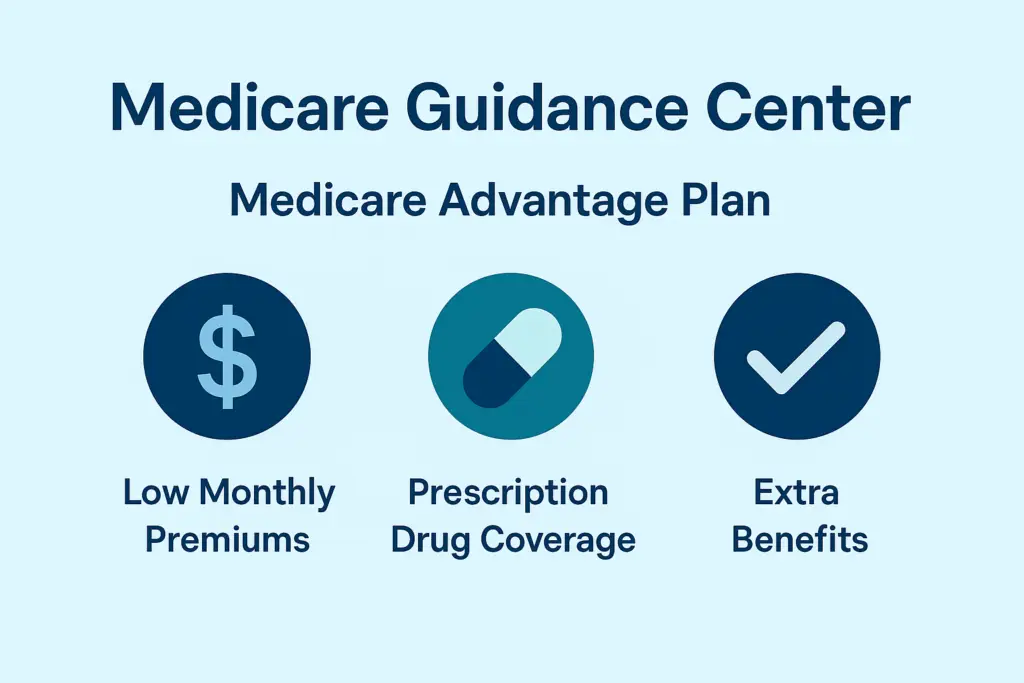Home » Medicare Advantage Plans
Medicare Advantage Plans: An Overview of Benefits and Options
If you’re exploring health coverage options through Medicare, it’s essential to understand Medicare Advantage Plans. Also known as Medicare Part C, these plans combine the benefits of Original Medicare with additional services, often including vision, dental, hearing, and prescription drug coverage.
In this guide, we’ll break down how Medicare Advantage Plans work, what they offer, who’s eligible, and how to locate a Medicare agent in Mesa, Arizona to guide your decision.

What Are Medicare Advantage Plans?
Medicare Advantage Plans are offered by private insurance companies approved by Medicare. These plans replace your Original Medicare (Part A and Part B) coverage with an all-in-one alternative that often includes extra benefits not covered by traditional Medicare.
Most Medicare Advantage Plans include:
Hospital coverage (Medicare Part A)
Medical coverage (Medicare Part B)
Prescription drug coverage (Part D)
Additional services like dental, vision, hearing, and fitness memberships
How Do Plans Work?
With Medicare Advantage Plans, you still remain in the Medicare program, but your benefits are administered through a private insurer. You’ll typically use a provider network, similar to an HMO or PPO.
Key features:
Low or $0 monthly premiums (in some cases)
Out-of-pocket limits, which Original Medicare does not provide
Copays and coinsurance may vary by plan
Most plans require you to use doctors and hospitals in their network
Who Is Eligible for Coverage?
To join a Medicare Advantage Plan, you must:
Be enrolled in both Medicare Part A and Part B
Live in the plan’s service area
Not have End-Stage Renal Disease (with some exceptions)
You can enroll during:
Your Initial Enrollment Period (around your 65th birthday)
Medicare Annual Enrollment Period (Oct 15 – Dec 7)
Special Enrollment Periods (e.g., moving or losing coverage)
What Do Plans Cost?
Costs for Medicare Advantage Plans can vary based on your location and the plan you choose. However, many plans offer:
$0 monthly premiums
Competitive copays and coinsurance
An annual out-of-pocket maximum to protect you from high costs
Even if the plan has a $0 premium, you must still pay your Medicare Part B premium.
What’s the Difference Between Medicare Advantage and Original Medicare?
| Feature | Original Medicare | Medicare Advantage Plans |
|---|---|---|
| Provider Flexibility | Any Medicare provider nationwide | Usually in-network only |
| Prescription Drugs | Not included (Part D separate) | Often included |
| Additional Benefits | Limited | Frequently included |
| Out-of-Pocket Limit | No | Yes |
Why Should I Work with a Local Medicare Agent?
Choosing between plans can be overwhelming. A licensed professional can explain Medicare Advantage Plans, compare options, and help ensure you get the best coverage for your needs and budget.
If you’re wondering how to locate a Medicare agent in Mesa, Arizona, the Medicare Guidance Center is here to help.
Our agents:
Offer no-cost consultations
Compare multiple insurance carriers
Help you understand coverage, networks, and out-of-pocket costs
Ensure you’re maximizing your Medicare benefits
How to Enroll in a Medicare Advantage Plan
Confirm your eligibility (you need both Part A and B).
Compare plans in your area based on cost, coverage, and network.
Contact a licensed Medicare agent to help with enrollment.
Enroll during a valid enrollment period.
Key Takeaways About Medicare Advantage Plans
Medicare Advantage Plans are private alternatives to Original Medicare.
Many plans include drug, dental, vision, and hearing coverage.
You must live in the plan’s service area and have both Part A and B.
A local Mesa Medicare agent can simplify the decision-making process.
Need Help Comparing Medicare Advantage Plans?
Visit here to connect with a trusted Medicare advisor in Mesa, Arizona. Our team is here to guide you every step of the way.
Advantage Rate Comparison
Thousands of Satisfied Customers

